There are 1.62 billion daily active users on Facebook. That means everyone, from your grandmother to your nephew, is using the social media platform.
What does this statistic mean for business owners? It tells us that our customers are on social media, specifically Facebook. And if your customers are there, so should your business.
Maintaining an active Facebook business page is essential for business success. Marketers can use boosted posts and ad campaigns to connect with new customers and generate sales.
But do you know the difference between a Facebook boosted post vs ad campaign? These two tools may seem similar, but they deliver very different results.
Let’s review Facebook boosted posts, Facebook ads, and when to use what.
Facebook Boosted Posts
Facebook boosted posts are created from existing page posts. Facebook boosting allows users to promote regular Facebook posts to reach a wider audience.
Before boosting, the only people who saw your business’s Facebook posts were those who followed your page. But times have changed, and you can buy views.
If you don’t have a loyal following on social media, organic posts, or the posts you don’t spend money on, are only seen by a few people. The average organic post reaches 6.4% of your page’s followers.
Due to low organic reach, many business pages add money to their posts. Boosting guarantees your posts are seen and reaches people outside of your followers.
Boosted posts are an excellent way to demonstrate what your team can do. A landscaper may boost a post showing off a recently groomed lawn. A builder can boost photos of a recently remodeled home.
Why Use Boosted Posts?
Business owners boost posts for three key reasons:
- Ease and simplicity
- Increased Facebook reach
- Greater brand visibility
Let’s review these three benefits in more detail.
Boosting Posts Is Easy
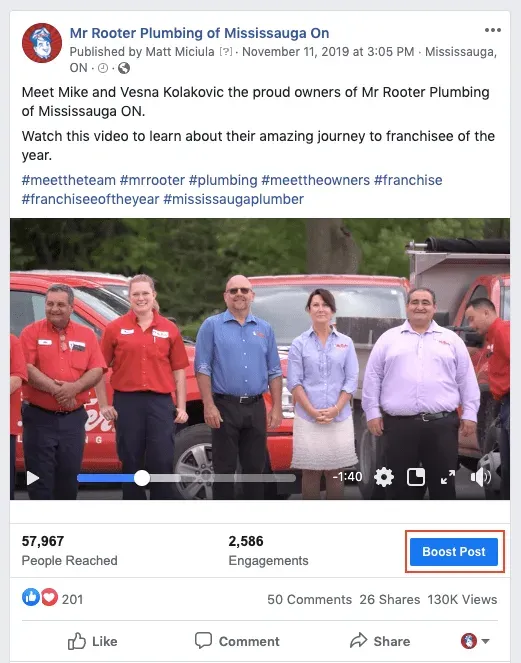
Boosting can be done without leaving your Facebook page. It’s a simple and fast way to ensure your content is seen by current and prospective customers. Many business owners use Facebook boosted posts because of how straightforward they are.
Boosted posts don’t require complex budgets. The only requirement is that the post has $1 for every day it is promoted. Business owners can pay anything, from $3 or $300, promoting their posts.
Keep in mind, the more money you spend boosting your Facebook posts, the higher the reach will be.
Boosting Posts Increases Reach
Promoted posts focus on reach and engagement.
Facebook post reach is the number of unique people who see your content. By adding a budget to your posts, Facebook pushes your content to people and expands the number of users who see what you have to say.
Before boosting posts on Facebook, your reach may be between 10 and 15 users. After boosting posts on Facebook, that number may increase to 100 users or more.
Boosting Posts Increases Engagement
Engagement is any action a user takes on Facebook posts. Examples of engagement include reacting, commenting, or sharing your posts.
Facebook engagement is a key metric for marketers because it shows that not only are people seeing your Facebook posts, but they are connecting and responding to them. Higher engagement leads to a better brand following.
For example, when a user sees your boosted post, he or she may comment or share the post. When this engagement occurs, the user’s friends see your post. That’s free advertising for your business.
When you promote a post on Facebook, you have the opportunity to target users that are likely to respond to your content. When a user within your target demographic sees something they agree with, he or she is more likely to engage with the post.
How to Create Boosted Posts
Boosted posts are designed to be simple.
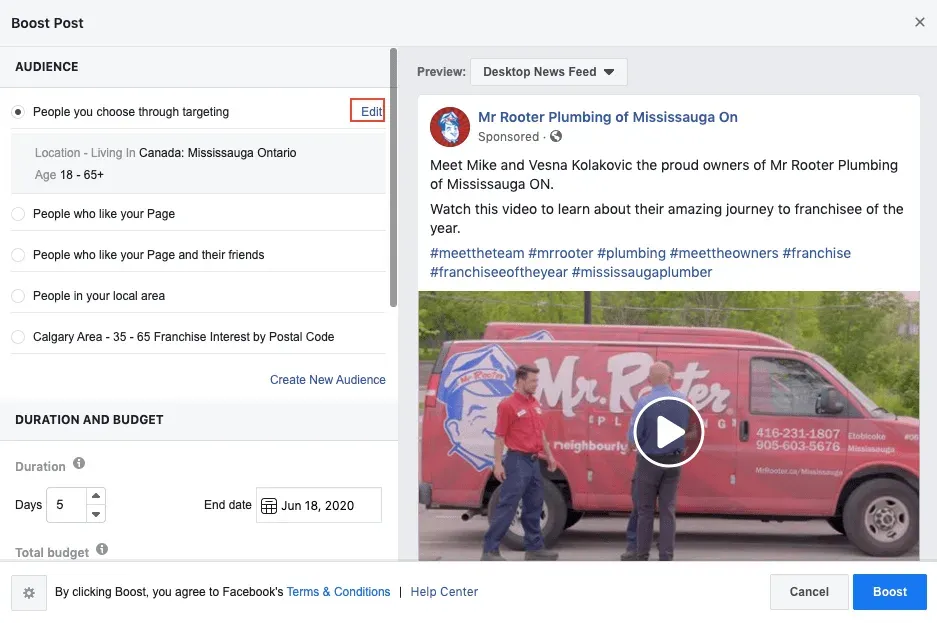
First, create a normal Facebook post. Once complete, select the “Boost Post” button located at the bottom of the post. You will have the option to select the promotion’s target audience, budget, and duration.
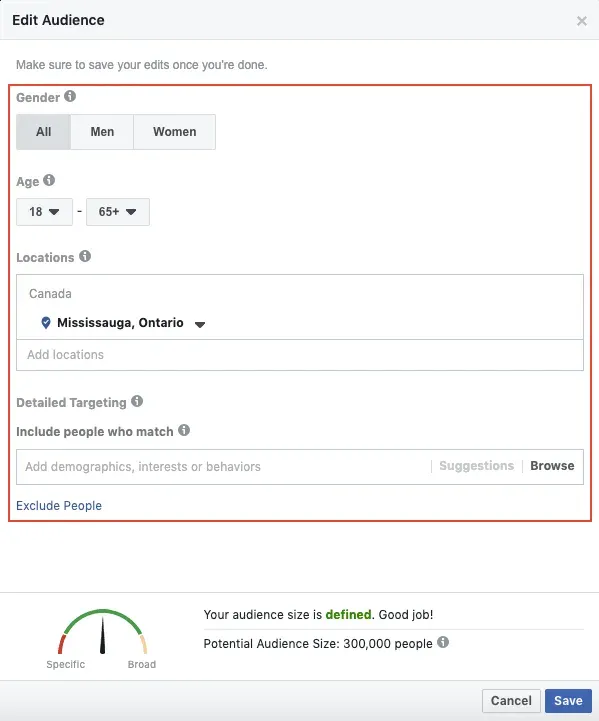
Select your desired audience’s age, sex, location, and interests. The audience feature allows users to set parameters on who will see your post. The audience can be broad, but it’s more effective to focus on specific demographics.
Pro tip: Ensure that you include additional targeting options to avoid wasting spend.
Next, establish your ad budget. As mentioned, the budget is flexible, as long as the post has $1 USD, or your local currency equivalent, per day. If you’re promoting a post for one month, you will need to budget at least $30 for the campaign.
When you submit your budget, Facebook will estimate your post’s reach. For example, $5 may reach between 500 and 2,000 people, while $10 will reach between 1,000 and 3,000 users.
Finally, select the amount of time you want your boosted post to be promoted. You can boost the post for 24 hours or for months. The choice is yours.
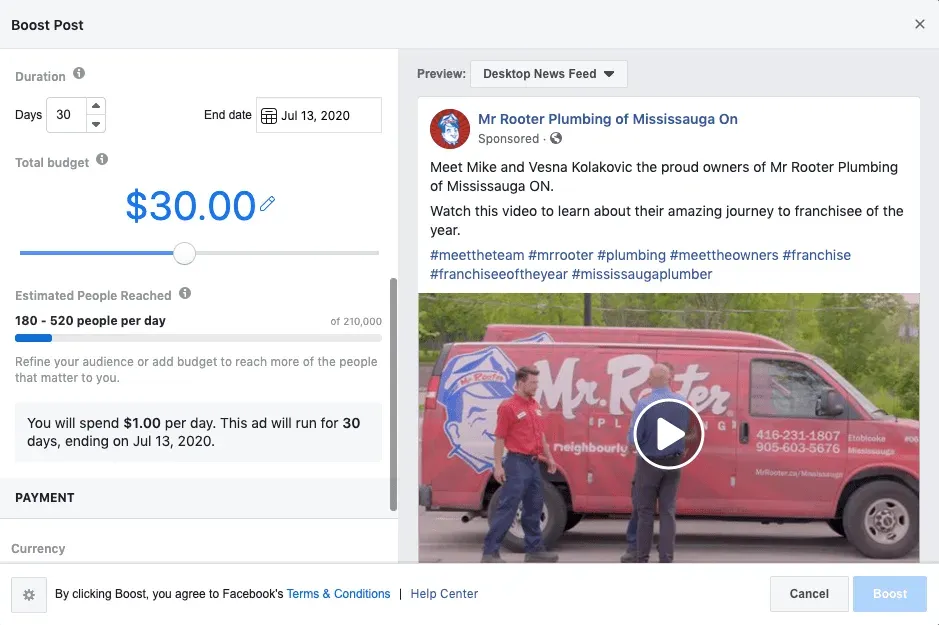
Once you have created your boosted post, Facebook will review it. As long as the post adheres to Facebook’s Ad Policies, your promotion should be approved. Once approved, the post will automatically start boosting out to your target audience.
Keep in mind that while your post is running, some editing features may be turned off. Make sure your post is correct and check grammar before submitting it to Facebook for review.
Facebook Ads
Facebook ads are different from boosted posts. These ads are created in Facebook Ads Manager and come in a variety of formats.
The average Facebook user clicks on 11 ads per month (or once every three days). Women tend to click on 14 ads a month, while men click on 10.
Facebook ads can appear in numerous places. They may show in a person’s feed, in Messenger, or in Facebook Marketplace. Ad creators can customize where the ads are shown.
Before creating a Facebook ad, you should have a clear business objective in mind. Once you identify your goal, you can pick the most effective ad type.
Types of Facebook Ads
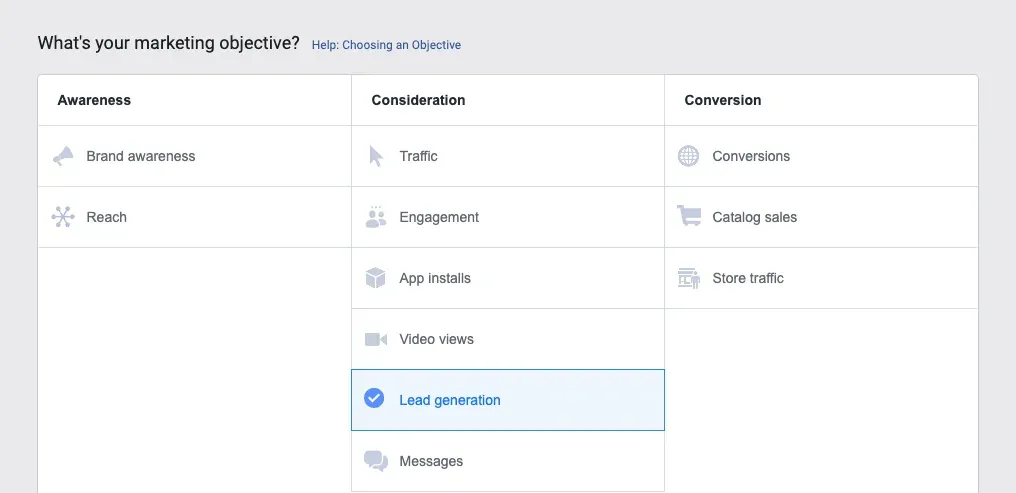
While boosted posts increase engagement and reach, Facebook ads come with many more actions. Each type of ad has a different purpose, giving business owners the tools they need to accomplish it.
Let’s explore all of the different types of Facebook ads.
Awareness Facebook Ads
Awareness ads are designed to reach broad audiences and increase brand visibility. Targeted campaigns help users discover your business. These ads are ideal for building an audience and establishing brand awareness.
Marketers use high-quality images and videos to reach large audiences through Awareness Ads. Creating memorable ads encourages people to take action, such as following your business page.
Awareness ads are ideal for new businesses or those trying to build a social media following. If you are launching a new product or service, awareness ads can get the message out to users who might be interested.
Consideration Facebook Ads
Consideration Facebook ads encourage action. Examples of consideration ads include:
- Website traffic – send people to your website or landing page
- Engagement – reactions, comments, event responses, and shares
- App installs – encourage users to install your app
- Video views – generate video views
- Lead generation – acquire new leads
- Messages – get users to send your business a message
Consideration ads are excellent at generating the results you’re looking for. Be sure to invest in high-quality images or videos to ensure users engage with your ad.
There are a lot of moving parts to acknowledge when creating a consideration ad.
For example, website traffic ads must send users to a fast-loading website or landing page with a clear call-to-action. If you choose a message ad, someone must monitor and respond to incoming messages.
Cover all of your bases to ensure your consideration ad generates a high ROI.
Conversion Facebook Ads

Conversion ads are very specific. They encourage users to complete an action or purchase a service.
Conversion ads can encourage action on your website, increase product sales, and drive in-store foot traffic.
While conversion ads offer high rewards, they are also the most complicated ads to create and manage.
Conversion ads must be used in combination with a Facebook Pixel that follows users around the internet. For optimal tracking, conversion codes must be added to pages on your website or landing page.
Facebook’s conversion ads can be very successful, but they require careful monitoring. Without the right codes, you might not be able to link product or service sales with the ads. This can create the appearance of a low ROI for your ad campaign.
Creating and Managing Facebook Ads
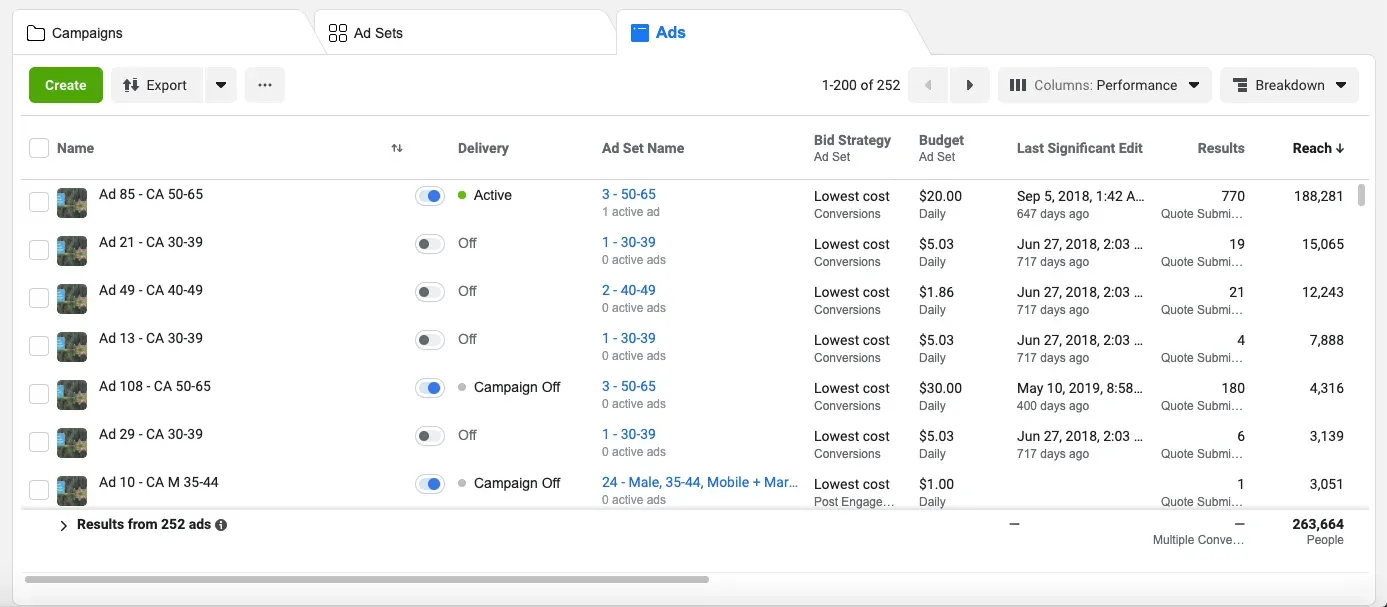
Facebook ads must be created through Facebook Ads Manager. Once in the system, click the Campaigns tab and select Create to generate a new campaign.
Select the type of Facebook ad you want based on your objective. Once you begin, Facebook Ads Manager will take you through the steps of creating your ad.
You will select your target audience, budget, and ad placement. You will need to upload a high-quality image or video for the campaign. Once complete, you can preview how your ad appears in desktop, mobile, and other formats.
Facebook ads can also be integrated with Instagram for a higher audience reach.
Similar to Boosted Posts, once you complete your Facebook ad, it must undergo a review. The ad must adhere to Facebook’s policies and text limits before running.
You can revisit your ads and make changes at any time, but the ads will have to be reapproved after every change.
Facebook Boosted Post vs Ad
Now that you understand what Facebook boosted posts and Facebook ads are, which ones should you use in your social media campaign?
The answer depends on your social media marketing objective. Consider your long-term and short-term goals. Each format caters to different outcomes.
Facebook ads are designed for specific goals, like installing an app or generating leads. Meanwhile, boosted posts are designed for building a stronger, more-engaged social media following.
When deciding which type to create, consider the pros and cons of boosted posts and ads.
The Pros
Boosted posts are easy and simple. If you’re looking to reach a lot of people quickly, boosted posts are the way to go. If you have photos or good content that you want people to see, boost your post.
Boosting posts is not complicated and doesn’t require a lot. It can be done within your Facebook page for a low budget.
If you have a specific objective in mind, such as increasing website traffic, Facebook ads are the best option. The ads use their advanced targeting capabilities to reach prospective customers.
Facebook ads also come in a variety of formats. This includes single-image ads, video ads, and carousel ads. You can also get creative with your ads and run a unique promotions such as Birthday discount like Larry Kim and the the MobileMonkey team suggests in this Facebook Ads blog post.
Facebook ads are ideal for marketers who like to be in control. While boosted posts feature audience targeting options, Facebook ads offer more advanced settings. Marketers can create remarketing ads, generate LookaLike audiences, and control where their ads show up.
The Cons
Boosting Facebook posts has limitations. You cannot guarantee certain objectives are met through boosting.
Boosted posts are best suited for page likes, comments, shares, and brand awareness. Other objectives are best done through an ad campaign.
But while Facebook ads give users more control and reach specific business objectives, the ads come with stricter rules.
For example, Facebook ads must adhere to a 20% text rule. This means 20% or less text must exist in an ad’s photo or video in order to run.
Facebook ads can also be a bit more complicated compared to boosted posts. They require Ads Manager, and certain ads need coding to see results.
It’s no secret Facebook ads can be a bit complicated. That’s why Digital Shift offers Facebook Ads management services to make the entire process easy. Facebook also offers a Facebook Blueprint Certification course for people to learn Ads Manager and better understand metrics for evaluating ad performance.
Now that you know the differences between a Facebook boosted post vs ad campaign, are you ready to take your social media marketing up a notch?
Our team’s social media tactics result in a stream of new customers. We use proven methods to create effective ad campaigns and launch our clients to success.
Contact our team to learn more about our social media marketing services. Together, we can enhance your digital reputation and grow your business.